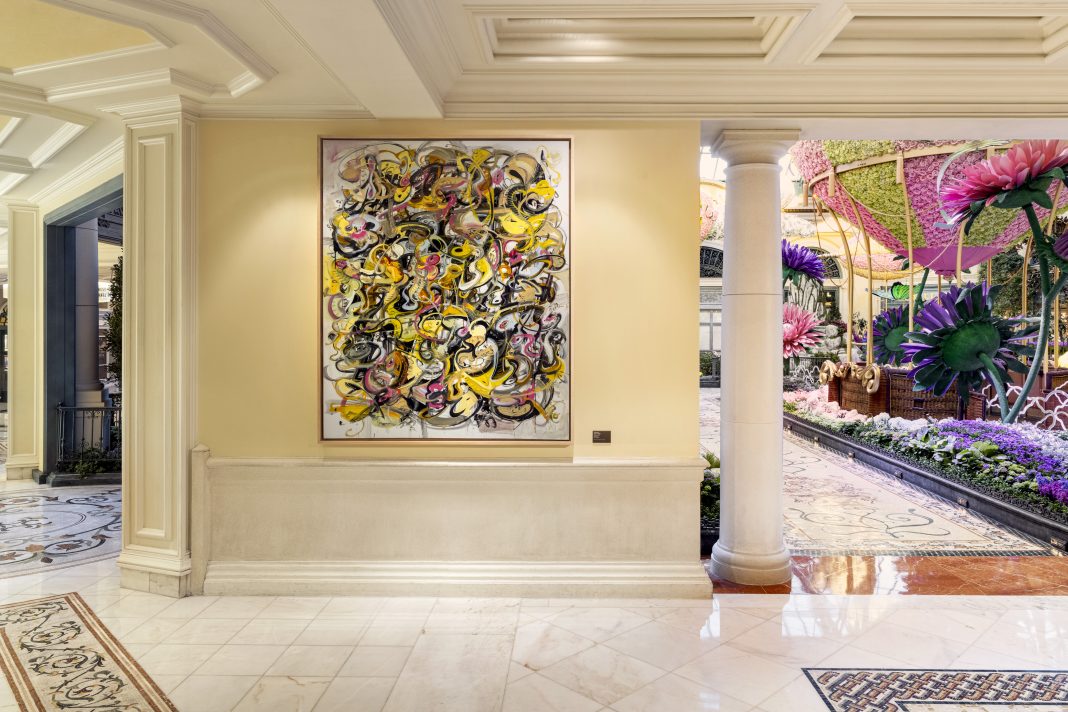

Since March MGM Resorts revealed new acquisitions for its public fine art collection as it reshapes and contemporizes its offerings with a focus on diversity, equity and inclusion. Acquired works by Rashid Johnson, Sanford Biggers, Derrick Adams, Ghada Amer, Jonathan Lyndon Chase, Tomás Esson and Svenja Deininger are among the new talents now showcased alongside existing works by artists such as Sam Gilliam, Lorna Simpson, Nick Cave, Jenny Holzer and Nancy Rubins throughout MGM Resorts’ properties.
The company’s goal is to provide an extended platform for artists of color, women and the LGBTQIA+ community – and to amplify these voices through its portfolio, reflecting MGM’s commitment to advancing diversity, equity and inclusion globally.
“We believe in the power of art to open minds, change perspectives and create transformation in society,” said Ari Kastrati, MGM Resorts’ Chief Hospitality Officer. “The addition of these talented artists to our portfolio reflects MGM’s commitment to championing inclusion and ensuring that the collection more closely mirrors our diverse communities. That commitment is central to our company’s core values and is imbued in all that we do.”
New artists within the collection include:
- Rashid Johnson – One of today’s pre-eminent contemporary artists, Johnson melds photography, sculpture and painting to inspire conversation on race and class. Using materials that correlate to moments in history – including specific references to African American life – Johnson aims to create art that can serve as a bridge to cultural barriers. Of his work, Johnson said, “I consider the Cosmic Slops to be paintings. I think it’s a process for me that helped me reintroduce painting to my practice. I often come to the studio and it’s almost a meditative space for me to be able to make a Cosmic Slop. It almost functions as the stretch before a workout. It’s that time that I have to start to understand my body, to think about the materials that I’ve used, to think about the authenticity of my gesture and how I’m authoring that gesture. And it feels wholly mine…I think that there’s an opportunity for truth there. And we don’t have so many opportunities to be so authentic and so genuine and so true. And I think that this body of work in particular from me is very much truth.”
- MGM Resorts acquired one of Johnson’s three-dimensional wall works from the Cosmic Slop series comprising black soap and microcrystalline wax, which are melted together and then hand-poured to create unique surfaces. The work is located on ARIA’s promenade level.
- MGM Resorts acquired one of Johnson’s three-dimensional wall works from the Cosmic Slop series comprising black soap and microcrystalline wax, which are melted together and then hand-poured to create unique surfaces. The work is located on ARIA’s promenade level.
- Sanford Biggers – Powerful and poignant, Biggers’ work offers perspective on key moments in American history with a focus on overlooked cultural narratives from a social, political and economic standpoint. Last summer, Biggers’ largest work to date – his monumental bronze sculpture, Oracle – was on display at Rockefeller Center. Oracle builds on Biggers’ Chimera series, which combines African masks and European figures to shed light on how Greco-Roman and African sculpture have been transformed over time to reinforce often misunderstood perspectives on culture and aesthetics. Oracle is a seated body reminiscent of the Temple of Zeus featuring a head inspired by masks and sculptures from African cultures.
- MGM Resorts acquired a smaller-scale bronze sculpture of Oracle (2021) which has been installed at ARIA, near the resort’s self-parking entrance.
- Derrick Adams – Adams is a painter who uses pattern, collage and a bold palette to create iconic graphic paintings of Black culture. In particular, the artist probes how Black American experiences relate to American iconography, art history, urban environments and consumerism. In his Floater series, Adams depicts figures relaxing in pools of water, suggesting that respite is a political statement when embraced by Black communities. Discussing his Floater pieces with Vogue, Adams said, “I wanted to occupy a different space from all the artists who were speaking on issues of race and trauma and oppression. People couldn’t exist if they lived in constant grief. My work is focused on the idea of how crucial it is for Black people to think of leisure as a radical act.” In Adams’s Floater works and his oeuvre at large, Black joy and possibility remain at the forefront, evoked through scenes of leisure and normalcy—reconceiving perceptions the media and visual culture often put forward.
- MGM Resorts recently commissioned a new mixed-media painting from Adams’ Floater series, currently in production. This Floater is an especially rare example from that body of work because it consists of acrylic
- Ghada Amer – While Amer’s art spans painting, cast sculpture, ceramics, works on paper, garden and mixed-media installations, she is widely known for her expertise in depicting women through the medium of thread. Focused on portraying femininity in varying contexts, Amer’s work serves to empower women to realize their true identity and reach their full potential outside the constructs of cultural and religious norms often shaped through masculine views.
- MGM Resorts acquired two of Amer’s works featuring acrylic, embroidery and gel medium on canvas from her series The Women I Know Part II, which includes embroidered and painted portraits of women Amer knows personally. For each portrait, the artist includes phrases and quotes regarding feminist and social issues, including lines such as “Do not fit into the glass slipper like Cinderella did – shatter the glass ceiling.” Of the series, Amer has said, “I now feel liberated from the canon of art history and from the father figures of painting. The only reference now in my work is the subject matter, that is painting itself.” Amer’s works are prominently featured within Bellagio’s Spa and Salon.
- MGM Resorts acquired two of Amer’s works featuring acrylic, embroidery and gel medium on canvas from her series The Women I Know Part II, which includes embroidered and painted portraits of women Amer knows personally. For each portrait, the artist includes phrases and quotes regarding feminist and social issues, including lines such as “Do not fit into the glass slipper like Cinderella did – shatter the glass ceiling.” Of the series, Amer has said, “I now feel liberated from the canon of art history and from the father figures of painting. The only reference now in my work is the subject matter, that is painting itself.” Amer’s works are prominently featured within Bellagio’s Spa and Salon.
- Jonathan Lyndon Chase – Chase’s artwork focuses on the nuances of queer Black life in vivid portraits, showing subjects in various aspects of domestic life. Featuring painting, collage and drawing, Chase’s bold canvases often portray floating heads and bodies overlapping against colorful, ambiguous backdrops and explore how closeness is essential to community connectivity. On Chase’s approach to their work, the artist has said, “I try to paint very honestly with a delicacy to the body. I’m a big softie, and I’ve been described as being vulnerable and transparent. I like to feel a connectiveness to people. In my work I’m thinking about how queer bodies, Black bodies are very complex.”
- MGM Resorts acquired Chase’s work The Cook Out (2019), featuring acrylic paint, oil paint, spray paint, oil stick, marker and graphite on canvas, which is located at Park MGM, adjacent to the resort’s lobby.
- Tomás Esson – Tomás Esson’s work reflects his love for painting but is tempered by the dark subject matter many of his works depict. Esson was born in Cuba but migrated to the U.S. in the early 1990s. His works are often inspired by the cultural challenges of the 1980s. The mythical creatures portrayed in Esson’s paintings are grotesque and have an identity of their own, free of illustrative references and weaknesses. The “Miami Flow” paintings, which began in 2015, intensify the slivers of landscape that have always been present in Esson’s figurative works into dynamic abstraction. Beginning with sexualized flowers and lascivious vegetation in the early paintings in the series, the “velocity” in the work eventually led the “Miami Flow” paintings to become increasingly abstract, severed from any obvious referents. Esson here borrows the logic of coupling forms (from early animation) in order to intensify an abstract vision. It is almost as if the sub-visual dynamics of the landscapes—the microbial and chemical transaction—are being amplified into gestural visual forms.
- Svenja Deininger – Extended time is crucial in the composition of Deininger’s work: beginning with an initial visual concept, through a gradual process of juxtaposing patterns, tones, shapes and memories from a vast archive of art historical references, Deininger’s configurations finally emerge. Yet, such a composition can be re-calibrated through a series of changes in the organization of pictorial space. It is a patient, continuous, even obsessive process of crafting and adjusting the possibilities of a distinct vocabulary of forms and its multiple incarnations. Time, or rather an abundance of time, is key to another crucial aspect of Deininger’s works: the surface, if not to say the skin. Upon closer inspection, Deininger’s paintings reveal a carefully measured system of superficial treatments of shapes: a series of patient gestures of painting, scraping, polishing, and repainting. It is a process that allows for light to have a decisive role on each painted surface. The result is a layering of clearly defined patterns treated with a variety of techniques, producing different textures with minute discrepancies in thickness. her practice is an organic, holistic cycle of creation, utilizing the time to look and the time to do as equal, decisive forces. A practice where looking is reflecting is acting.













